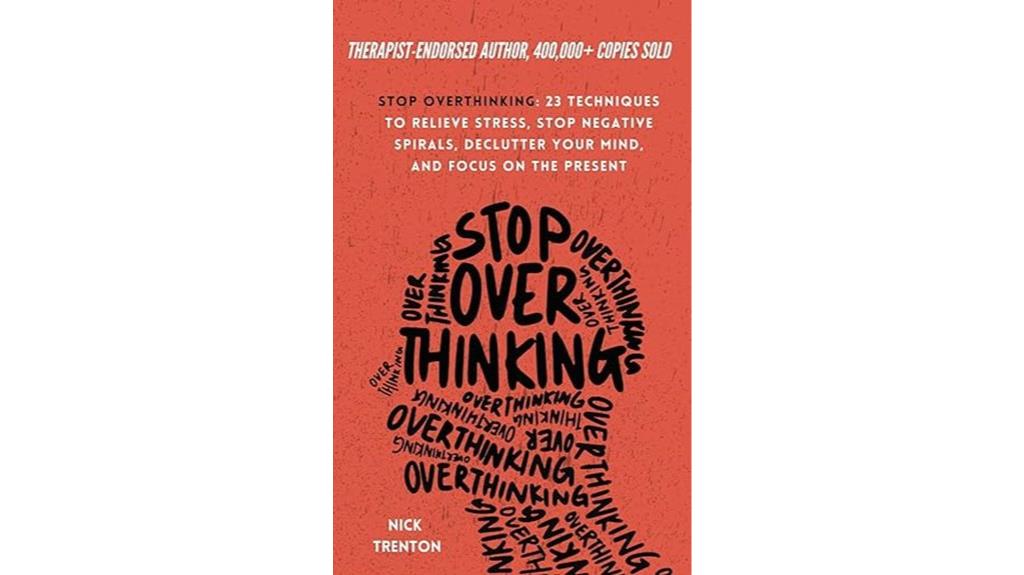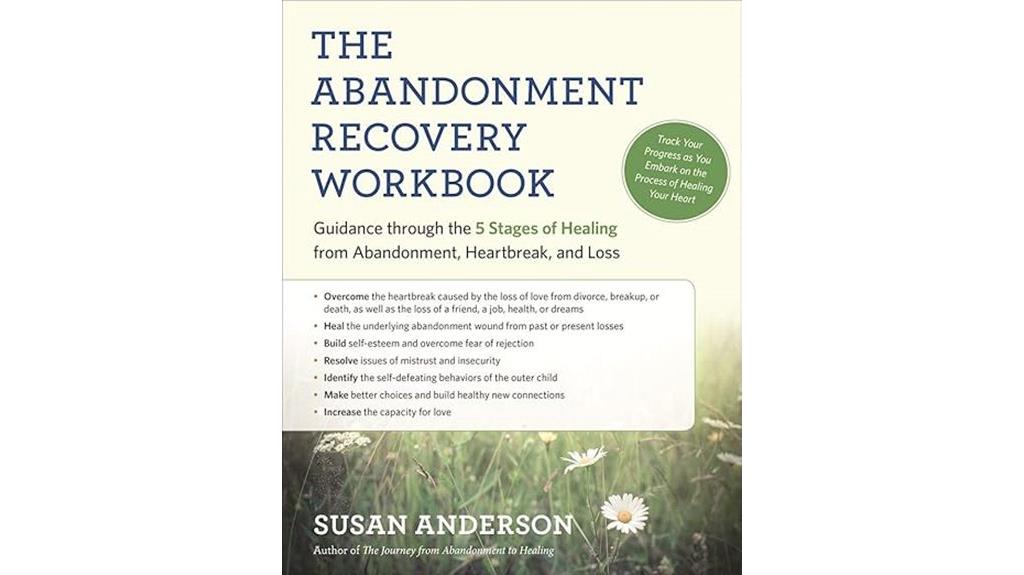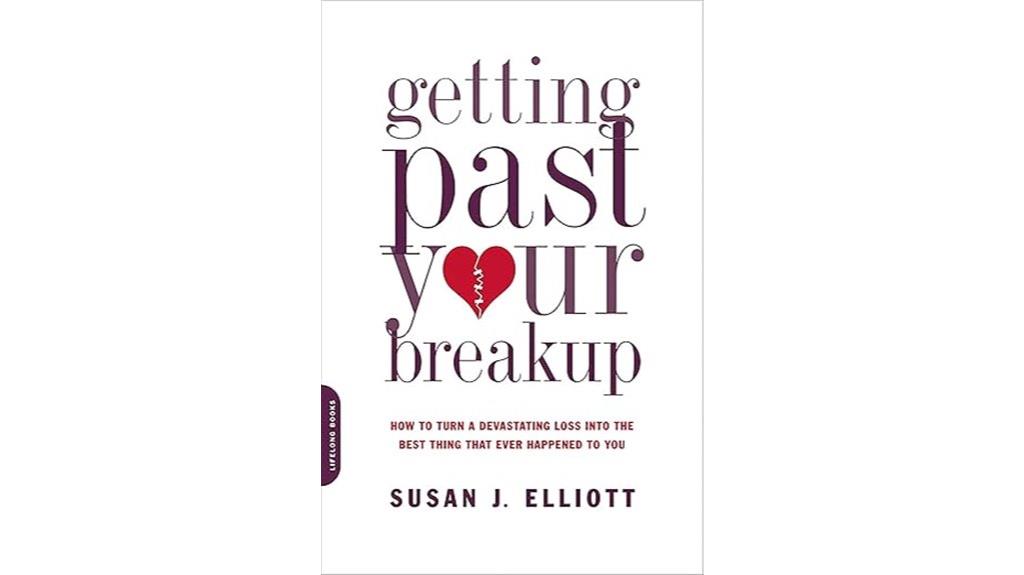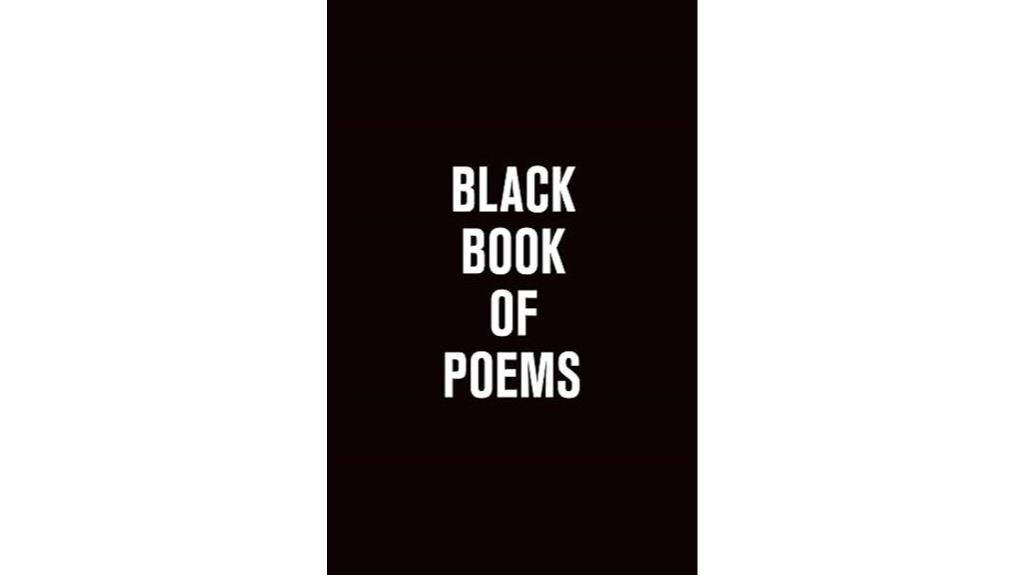If you’re looking for the best mindfulness books to heal heartbreak, I recommend exploring titles backed by experts that focus on self-love, emotional resilience, and mindfulness techniques. Books like *Self-Love Workbook for Women*, *Stop Overthinking*, and *Getting Past Your Breakup* offer practical exercises and gentle guidance to help you navigate pain and rebuild confidence. Beautiful poetry collections and structured activities can deepen your healing journey. Keep exploring these options to find the resources that resonate most with you.
Key Takeaways
- The list includes practical self-help workbooks like *Self-Love Workbook for Women* and *Stop Overthinking*, supported by mental health strategies.
- It features structured daily practices and exercises, such as journaling, mindfulness, and boundary-setting, to facilitate emotional healing.
- The collection highlights emotionally resonant poetry, like Hunanyan’s collection, to foster connection and processing feelings.
- Recommendations emphasize selecting books with empathetic language, clear instructions, and content tailored to personal healing goals.
- Expert-backed titles focus on self-compassion, resilience, and mindfulness techniques proven effective for heartbreak recovery.
Self-Love Workbook for Women

If you’re looking for a practical and inspiring way to rebuild your self-esteem after heartbreak, the Self-Love Workbook for Women is an excellent choice. I found it filled with powerful exercises and thought-provoking prompts that helped me release self-doubt and develop self-compassion. Dedicating just 10 minutes a day to its reflections made a noticeable difference in my confidence and emotional healing. The colorful, attractive design kept me engaged, and the flexibility allowed me to skip or focus on what resonated most. Many users report similar benefits, making this workbook a valuable tool for anyone on a journey to self-love and renewal.
Best For: women seeking a practical and inspiring tool to rebuild self-esteem, foster self-compassion, and promote emotional healing after heartbreak or during personal growth journeys.
Pros:
- Contains powerful exercises and thought-provoking prompts that facilitate self-discovery and confidence building
- Attractive, colorful design that keeps users engaged and motivated to continue daily reflection
- Flexible format allows customization, skipping, or focusing on relevant sections for individual needs
Cons:
- Some sections, such as the self-compassion quiz, may contain minor errors or inconsistencies
- Certain parts of the content may feel less engaging or less suited for some target audiences
- As a physical workbook, it may require dedicated space and time, which might be a challenge for very busy users
Stop Overthinking: Techniques to Relieve Stress and Focus on the Present

For anyone overwhelmed by racing thoughts and anxious about the present, “Stop Overthinking” offers practical techniques to regain mental clarity and reduce stress. I’ve found its 23 methods—like grounding exercises, mindfulness, and goal-setting—powerful tools to break negative thought spirals. The book’s clear, compassionate approach makes it easy to implement these strategies daily, whether through simple breathing techniques or cognitive shifts. Many readers, myself included, experience calmer minds, better focus, and less anxiety. It’s a straightforward, accessible resource that empowers you to take immediate steps toward emotional resilience and a more peaceful, present life.
Best For: individuals overwhelmed by racing thoughts and seeking practical, easy-to-apply techniques to reduce stress and stay present.
Pros:
- Provides 23 actionable methods rooted in mindfulness and CBT that are straightforward and adaptable.
- Clear, compassionate writing style makes complex mental health concepts accessible for beginners.
- Immediate applicability of strategies leads to noticeable reductions in anxiety and stress within weeks.
Cons:
- Some sections could benefit from deeper explanations of certain techniques.
- The focus on practical exercises may overlook detailed theoretical background.
- As a self-help book, it may not replace professional therapy for more severe mental health issues.
The Abandonment Recovery Workbook

The Abandonment Recovery Workbook stands out as an excellent choice for individuals seeking structured, practical guidance to heal from recent or adult abandonment and relationship trauma. It guides you through five healing stages with clear exercises, journaling prompts, and self-soothing techniques. Many users report feeling emotional relief and growth after working through it over months. While it’s mainly focused on adult abandonment, it’s accessible to a broad audience, including teenagers and professionals. Keep in mind, it’s best used as a supplement rather than a standalone solution, especially if you have deep-seated or childhood trauma. It’s a helpful, relatable tool for processing heartbreak and loss.
Best For: individuals seeking structured, practical guidance to heal from recent or adult abandonment and relationship trauma, including teenagers, adults, and professionals.
Pros:
- Provides clear exercises, journaling prompts, and self-soothing techniques for emotional healing
- Accessible language suitable for a diverse audience, including those with processing difficulties
- Offers a structured approach that complements therapy or personal growth efforts
Cons:
- Focuses mainly on adult abandonment, with limited coverage of childhood trauma or complex early issues
- Material may be too basic for users with deep-seated trauma or prior therapy experience
- Not a standalone solution; best used as a supplement to professional help, especially for complex cases
Getting Past Your Breakup: How to Turn a Devastating Loss into the Best Thing That Ever Happened to You

Anyone serious about transforming heartbreak into personal growth will find “Getting Past Your Breakup” an invaluable resource. This book offers practical, measurable steps and direct advice, focusing on self-healing rather than dwelling on the ex. It teaches you how to create personalized affirmations and emphasizes the importance of setting boundaries, maintaining no contact, and working through grief actively. Recognized by mental health professionals and individuals alike, it provides tools comparable to therapy, helping you examine unhealthy patterns, rebuild confidence, and foster lasting change. It’s a powerful guide to turning loss into an opportunity for growth, making recovery both achievable and transformative.
Best For: individuals seeking practical, actionable strategies to heal from breakup trauma and foster personal growth.
Pros:
- Offers measurable steps and direct advice that can be implemented immediately
- Emphasizes self-healing, boundary setting, and creating personalized affirmations
- Recognized by mental health professionals as a comprehensive, therapy-like resource
Cons:
- Requires active effort and commitment; not a quick fix
- May be overwhelming for those not ready to confront deeper emotional issues
- Some readers might prefer more anecdotal or emotional storytelling over practical exercises
Wake Up to the Joy of You: 52 Meditations and Practices

If you’re seeking a gentle, practical guide to reconnect with your inner joy and cultivate self-acceptance, *Wake Up to the Joy of You* offers 52 meaningful meditations and practices designed to support your journey. This book has transformed many lives by fostering inner happiness, authenticity, and vulnerability, especially during uncertain times. Agapi shares simple, practical wisdom rooted in love and self-awareness, making deep concepts accessible. Its weekly meditations fit easily into daily routines, helping you build a sustainable mindfulness practice. Whether you’re new to self-care or experienced, this inspiring book encourages self-trust, emotional resilience, and a renewed sense of connection with yourself and others.
Best For: individuals seeking a gentle, accessible, and practical guide to reconnect with their inner joy, cultivate self-acceptance, and build emotional resilience through mindfulness and self-awareness practices.
Pros:
- Offers 52 weekly meditations and practices that are easy to incorporate into daily routines.
- Rooted in love, authenticity, and vulnerability, making deep concepts accessible and relatable.
- Suitable for beginners and experienced practitioners alike, with a warm, compassionate tone.
Cons:
- May require consistent effort to fully integrate the practices into everyday life.
- Some readers might prefer more structured or advanced meditation techniques.
- The focus on personal growth might feel repetitive for those already familiar with similar self-help approaches.
Black Book of Poems

Readers seeking honest, emotionally resonant poetry that gently navigates themes of loss and heartbreak will find Vincent Hunanyan’s “Black Book of Poems” especially meaningful. Hunanyan’s collection combines traditional rhyme with accessible, heartfelt language, making deep emotions approachable. His poems explore love, pain, solitude, and healing, offering comfort without pretension. Drawing from personal experience and universal themes, he encourages subjective interpretation, allowing each reader to find their own meaning. The work’s rhythmic structure invites reflection, making it a powerful tool for those healing from heartbreak. If you’re looking for poetry that touches the soul and fosters emotional connection, this collection could be exactly what you need.
Best For: readers who seek honest, emotionally resonant poetry that offers comfort and reflection on themes of loss, love, and healing using traditional rhyme and accessible language.
Pros:
- Combines traditional poetic forms with heartfelt, relatable themes.
- Encourages subjective interpretation, allowing personal emotional connections.
- Provides a rhythmic, accessible reading experience suitable for new and seasoned poetry lovers.
Cons:
- The rhyme-heavy structure may feel predictable or limiting to some readers.
- Some may find the themes too personal or emotionally intense.
- The collection’s traditional style might not appeal to fans of modern free verse or experimental poetry.
Factors to Consider When Choosing Mindfulness Books for Heartbreak

When choosing mindfulness books for heartbreak, I consider what feels most relevant to my situation and how easy the practices are to follow. I also look for books that offer emotional support and match the depth of content I need. Most importantly, I trust the credibility of the author to guide me effectively through my healing process.
Personal Relevance
How do you find a mindfulness book that truly speaks to your heartache? Start by choosing one that resonates with your personal experiences of loss or grief. When a book addresses specific emotional challenges you’re facing, like self-compassion or acceptance, it becomes more relevant and impactful. Pay attention to the tone and approach—whether it’s gentle encouragement or practical strategies—and see which suits your personality best. Select titles that include exercises or reflections you feel comfortable trying; this boosts consistency. Also, consider whether the book reflects your cultural background or values, helping you connect more deeply. Ultimately, a personally meaningful book will feel more authentic, offering guidance that genuinely supports your healing journey.
Ease of Practice
Choosing a mindfulness book that’s easy to practice can make a significant difference when healing from heartbreak. I recommend looking for books with simple, clear instructions and short exercises you can easily fit into your day. Guided meditations and step-by-step practices are especially helpful, making techniques more accessible when emotional distress feels overwhelming. Opt for books that use straightforward language, avoiding complex jargon that can make practice feel intimidating or confusing. Quick, practical exercises allow you to experience immediate relief without needing a lot of time, which is vital during difficult moments. Additionally, accessibility features like audio meditations or visual cues can support different learning styles and emotional states, ensuring mindfulness remains manageable and encouraging throughout your healing journey.
Emotional Support Focus
Selecting a mindfulness book that offers genuine emotional support can make a meaningful difference in your healing process. Look for books that use empathetic language and include compassionate exercises, affirmations, and grounding techniques designed to soothe heartbreak. Effective choices often focus on fostering self-compassion and encouraging gentle self-care during emotional turmoil. These books may feature guided meditations and reflective prompts that help you process feelings and build resilience. Prioritizing resources that validate your emotions and promote emotional resilience can help reduce loneliness and inspire hope. When choosing a book, consider whether it emphasizes emotional support—because feeling understood and supported is essential on your journey to healing. An emotionally supportive book can be a comforting companion as you navigate this difficult time.
Content Depth
When exploring mindfulness books for heartbreak, considering their content depth is essential because it directly impacts the guidance and support you’ll receive. Deeper books offer thorough practices, theoretical background, scientific explanations, and case studies, making them ideal for those seeking detailed understanding and long-term growth. If you’re in intense emotional pain, a book with substantial content can provide meaningful insights and sustained support, helping you process and heal more effectively. Conversely, lighter books focus on quick exercises and simple techniques, which may offer brief relief but less long-lasting change. Your choice should match your goals—whether you want immediate stress relief or a profound, ongoing mindfulness practice. Matching content depth to your familiarity with mindfulness ensures you get the right level of guidance to support your healing journey.
Author Credibility
Since the author’s credibility substantially influences the reliability of a mindfulness book for heartbreak, it’s important to pay attention to their background and expertise. An author with relevant credentials, such as professional training in psychology, meditation, or emotional healing, often provides more trustworthy guidance. Recognized authors who have published other works or hold academic qualifications in these fields tend to be reliable sources. Additionally, authors with personal experience recovering from heartbreak can offer authentic, empathetic insights rooted in real-life understanding. Publications from reputable publishers or endorsements by mental health professionals further verify credibility. Lastly, reviewing an author’s prior works and reader feedback helps gauge their consistency and trustworthiness in guiding emotional wellness and mindfulness practices for healing.
Practical Techniques
Finding a mindfulness book that truly supports healing from heartbreak means paying attention to the practical techniques it offers. I look for books that include exercises like breathing techniques, grounding methods, or meditation practices I can easily fit into my daily routine. It’s important that the book provides step-by-step guidance on managing emotional pain and breaking negative thought patterns linked to heartbreak. I prioritize resources with actionable strategies such as setting intentions, practicing self-compassion, and using visualization to build emotional resilience. Real-life examples or guided practices help me translate mindfulness concepts into everyday actions, making them more effective. Ultimately, I choose books that emphasize consistency, encouraging daily practice to foster ongoing healing and emotional stability over time.
Visual Design
Choosing a mindfulness book that feels inviting and soothing often comes down to its visual design. A calming color palette, clear typography, and engaging layouts make the reading experience more enjoyable and accessible. Attractive illustrations or meditative imagery can evoke tranquility and support emotional healing, especially during tough times. Well-organized pages and prompts that are easy to navigate encourage consistent practice, even when emotions are high. Additionally, a sturdy cover and quality paper make the book feel durable and inviting for daily reflection. The overall aesthetic should resonate with your personal taste and foster comfort. When the design aligns with your preferences, mindfulness exercises become more inviting, helping you stay engaged and fostering a sense of calm as you navigate heartbreak.
Frequently Asked Questions
How Can Mindfulness Accelerate Emotional Healing After Heartbreak?
Mindfulness accelerates emotional healing after heartbreak by helping me stay present and acknowledge my feelings without judgment. It allows me to observe my pain objectively, reducing overwhelm and fostering acceptance. I focus on my breath and body sensations, which calms my mind and lowers stress. This practice gradually helps me let go of lingering sadness, making space for self-compassion, resilience, and new beginnings.
Are There Specific Mindfulness Techniques Suited for Different Types of Heartbreak?
They say, “Different strokes for different folks,” and that’s true for mindfulness techniques too. I find loving-kindness meditation helps heal heartbreak by promoting compassion, while body scans ground me when emotions run high. If your heartbreak involves loss, mindfulness of impermanence can bring peace. I recommend experimenting with these methods to see what resonates best with your emotional state—there’s no one-size-fits-all for healing.
Can Mindfulness Books Replace Therapy in Healing Emotional Pain?
No, mindfulness books can’t replace therapy when it comes to healing emotional pain. I see them as helpful tools that complement professional support. Books can guide you in managing emotions and gaining insight, but therapy provides personalized strategies and a safe space to explore deeper issues. Combining both often leads to the best healing experience, and I recommend seeking therapy alongside mindfulness practices for true emotional recovery.
How Often Should I Practice Mindfulness to See Benefits?
I’d say consistency is key—practicing mindfulness daily really helps you see benefits. Even just 10 to 15 minutes each day can make a difference. Think of it as watering a plant; the more regularly you tend to it, the healthier it grows. So, set aside time daily, and over time, you’ll notice your emotional resilience strengthening and greater peace settling in.
What Role Does Self-Compassion Play in the Healing Process?
Self-compassion plays a vital role in healing because it helps me treat myself with kindness and understanding during tough times. Instead of criticizing myself for feeling hurt, I learn to accept my emotions and give myself grace. This gentle approach fosters emotional resilience, making it easier to move forward. When I practice self-compassion, I find it easier to heal and rebuild my confidence after heartbreak.
Conclusion
If you’re ready to heal, these books can be your guiding light through the storm. Think of them as a lighthouse, shining hope and clarity when darkness tries to take over. Remember, healing isn’t linear—sometimes you need to revisit these pages and find new strength. So, pick one that calls to you, and let it lead you toward peace. Your journey to joy begins with a single step—are you ready to take it?










